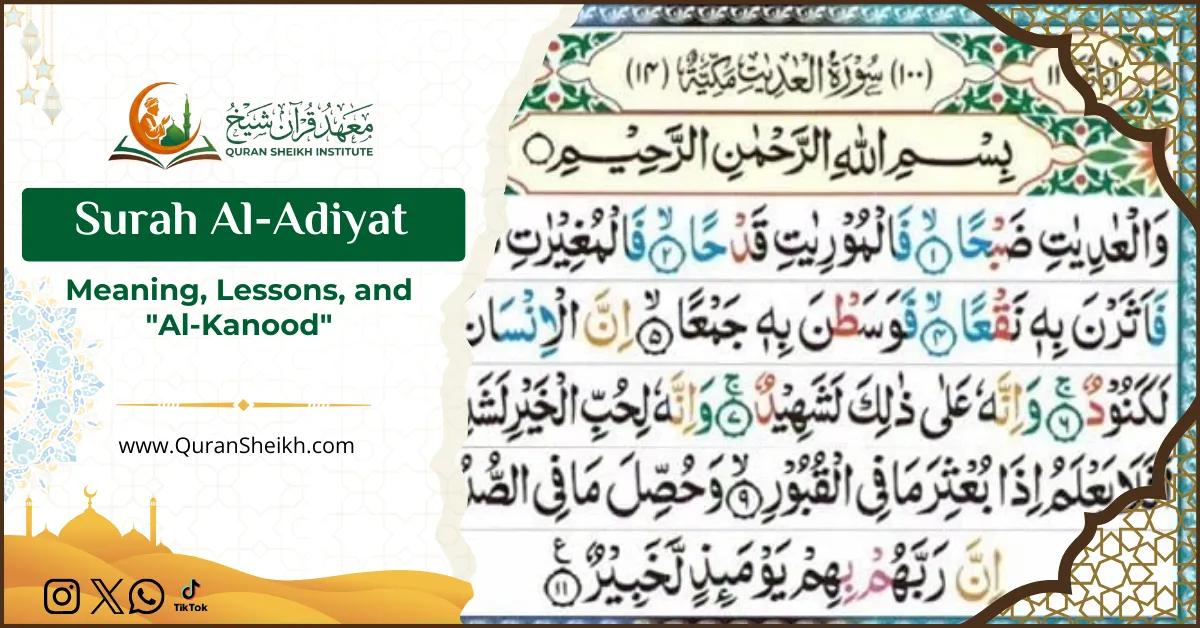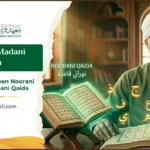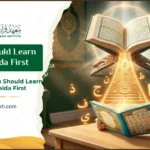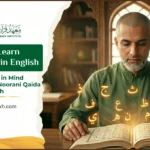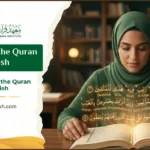Introduction: The Loyalty of the Horse, The Ingratitude of Man
The Surah opens with one of the most intense, cinematic, and auditory oaths in the entire Quran.
You can almost hear it: the violent panting of warhorses charging (Wal’aadi yaati dabha), the sound of their hooves striking sparks on the stone (Fal moori yaati qadha), and the sudden, chaotic raid at dawn (Fal mugheeraati subha). It’s an image of total effort, speed, and loyalty as these animals risk their lives for their human masters.
Why does Allah begin this (Meccan) Surah with such a powerful image of a creature’s loyalty?
To expose the disloyalty of ours.
This 11-verse Surah is a profound mirror. It contrasts the loyalty of a “lower” creature with the core sickness of humanity: “Al-Kanood”—our profound ingratitude to our Lord.
Listen to Surah Al-Adiyat: Recitation by Sheikh Mishary Rashid Alafasy
Listen to this beautiful recitation to perfect your pronunciation and reflect on the meanings before reading the explanation.
The Anatomy of the Warning: Understanding the 11 Verses
The Surah is a perfect three-act structure: The Oath, The Accusation, and The Reckoning.
(H3): Verses 1-5: The Image of Total Effort
1. By the racers, panting, 2. And the producers of sparks [when] striking 3. And the chargers at dawn, 4. Stirring up thereby [clouds of] dust, 5. Arriving thereby in the center collectively,
- The Contemplation: This is a picture of a creature (the warhorse) giving 100% effort for its human master. It charges into the heart of the enemy, panting, sparking, and kicking up dust, holding nothing back. It is the very definition of loyalty and obedience.
(H3): Verses 6-8: The Human Sickness (Al-Kanood) After painting this picture of loyalty, Allah gives the “answer” to the oath—the reason why He made it.
6. Innal-insana lirabbihee lakanood (Indeed mankind, to his Lord, is ungrateful.) 7. Wa innahu ‘alaa zaalika la shaheed (And indeed, he is to that a witness.) 8. Wa innahu lihubbil khairi la shadeed (And indeed he is, in love of wealth, intense.)
- The Contemplation: This is the core problem.
- “Al-Kanood” (Ungrateful): This isn’t just “ungrateful.” Kanood is the person who is actively ungrateful; the one who focuses only on the blessings they don’t have, while ignoring the ocean of blessings they do have. It is the person who forgets the Giver.
- “He is a witness”: He knows this about himself. Deep down, in his own heart, he is a witness to his own ingratitude.
- “Intense in love of wealth”: Here is the cause of the sickness. Why is he so ungrateful to his Lord? Because his heart is blinded by an intense, passionate love for “Al-Khair” (which here means wealth). His love for the material world is so “shadeed” (intense) that it makes him forget the source of that wealth.
(H3): Verses 9-11: The Inevitable Reckoning Allah then shatters this delusion of wealth with a terrifying question that serves as the cure:
9. Afala ya’lamu iza b’uthira ma filquboor (But does he not know that when the contents of the graves are scattered) 10. Wa hussila maa fis sudoor (And that within the breasts is obtained,) 11. Inna rabbahum bihim yauma ‘izil la khabeer (Indeed, their Lord with them, that Day, is [fully] Acquainted.)
- The Contemplation: The “love of wealth” is rendered worthless. The Surah reminds the ungrateful man:
- You will not be in your grave forever. You will be “scattered” from it.
- The wealth you loved will be gone. The only thing that will matter is what is “obtained from the breasts” (your heart)—the secrets, the intentions, the ingratitude, or the faith.
- And on that Day, you cannot hide. Your Lord is “fully Acquainted” with every moment of your ingratitude.
The Smart Bridge: The Antidote to ‘Al-Kanood’
This Surah is a diagnosis of a spiritual disease: Al-Kanood (Ingratitude), which is caused by Hubb-il-Khair (Intense love of wealth).
What is the antidote? Shukr (Gratitude).
And what is the highest form of Shukr? To use the blessings Allah gave us in the way He commanded. The greatest blessing He gave us is His guidance: The Quran.
When we are “intense” in our love for the world, it is because we are ignoring the Quran. The cure for a heart that is Kanood (ungrateful) is a heart that is connected to the Quran. But we cannot connect to a book we do not understand.
This is why learning the Quran with its Tafseer (explanation) and context is not a hobby—it is the essential medicine for the heart. At Quran Sheikh online Quran learning, our expert, one-on-one tutors specialize in providing this deep, transformative understanding, helping you turn your heart from Kanood (ungrateful) to Shakoor (grateful).
Your Daily Choice: Loyalty or Ingratitude?
Surah Al-Adiyat holds up a mirror and asks us a simple question.
Will you be like the horse—loyal, obedient, and giving your full effort for your Master? Or will you be the Kanood—the ungrateful man, blinded by his love for wealth, forgetting the Day when all secrets will be revealed?
The choice is ours to make with every breath we take.
For Reference: Transliteration and Translation
1. Wal’aadi yaati dabha (By the racers, panting,)
2. Fal moori yaati qadha (And the producers of sparks [when] striking)
3. Fal mugheeraati subha (And the chargers at dawn,)
4. Fa atharna bihee naq’a (Stirring up thereby [clouds of] dust,)
5. Fawa satna bihee jam’a (Arriving thereby in the center collectively,)
6. Innal-insana lirabbihee lakanood (Indeed mankind, to his Lord, is ungrateful.)
7. Wa innahu ‘alaa zaalika la shaheed (And indeed, he is to that a witness.)
8. Wa innahu lihubbil khairi la shadeed (And indeed he is, in love of wealth, intense.)
9. Afala ya’lamu iza b’uthira ma filquboor (But does he not know that when the contents of the graves are scattered)
10. Wa hussila maa fis sudoor (And that within the breasts is obtained,)
11. Inna rabbahum bihim yauma ‘izil la khabeer (Indeed, their Lord with them, that Day, is [fully] Acquainted.)
Frequently Asked Questions About Surah Al-Adiyat
[rank_math_rich_snippet id=”s-3308ce63-8f33-4dc9-8902-2d3e94c7c0ee”]

